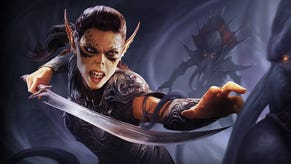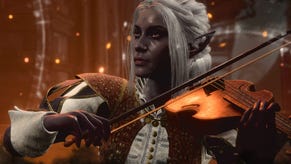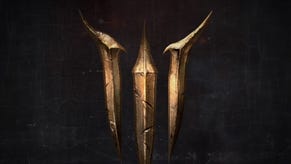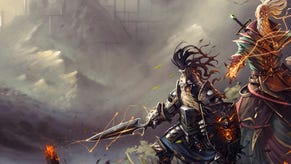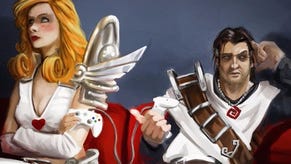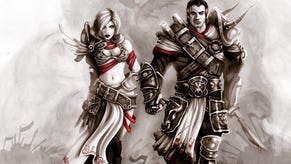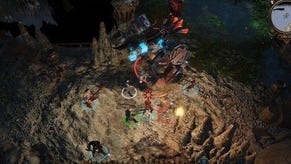Why Divinity: Original Sin might be the RPG you've been waiting for
Bad behaviour.
Swen Vincke is a menace. I'm trying to solve a mystery, something that may or may not be a murder, but he seems much more interested in wandering off, in petty theft or in getting into fights. When I try and help him out he has a habit of setting me alight, knocking me down or simply getting me killed. "Whoops," he says, as he prepares to resurrect me again. He insists these are accidents.
He's supposed to be a fellow adventurer, another member of the party, but he has a mind of his own. He's far more interested in following his own agenda and, right now, that agenda mostly involves experimenting. He tells me there's a lot in Divinity: Original Sin that he doesn't yet know about, that he hasn't seen, and he likes to have some distance between himself and his team so that he can be more objective about what they're adding to the game. It's more fun that way, he says. It's cooler. He likes the surprises.
He wants to show me all these surprises, too. "Try this," he says, or "Go here; pick up that; use this item." It's not just that he's excited to show me Larian Studios' latest project, it's that he thinks I might not spot many of these things otherwise. I might not expect them. Vincke's team have been trying to pack Divinity: Original Sin with a host of different concepts, systems and ideas. They're mixing together what they think are the best elements of many other roleplaying games and hoping their dough rises into a big, crisp, bountiful loaf.

And baking bread is just one thing that Vincke mentions when I ask him about the game's many influences. Chief among them is Ultima 7, a 20-year-old classic that Vincke says was something of an evolutionary dead end. "In my opinion, nobody made an RPG that actually improved upon Ultima 7," he explains. "That was my fix. That was what I was looking for in every single RPG since. I saw fractions of it, but I never saw it all again."
What Vincke is talking about is the variety and the interactivity that Ultima 7 demonstrated. It gave players a world where, as well as taking on quests, fighting monsters and exploring the wilderness, they could manipulate, combine or craft with most of the items they found. The world itself could also be altered by player action and just about any character killed, regardless of the ethical or mechanical consequences. Its plot was open-ended. It gave players a lot to play with, without prescribing how they should play.
It's that same level of complexity that Larian are aiming for and, while I'm busy chatting my way through dialogue trees or pouring over my character sheet, Vincke's keen to show off all the items he can craft and combine. That, and the many ways he can use magic to cause havoc.
A plank of wood and some nails become a club. Meat can be cooked. Heavy items can be dropped on pressure pads to trigger traps. I'm free to grow my character's skills as I wish, but if I decide I want enjoy a little spellcasting then I open up another world of prankish possibilities. Blasts of chill air turn water to ice and send attackers skidding, while searing magical heat can turn that water to vapour, obscuring lines of sight. A zap with a bolt of electricity then turns this into a dangerous static cloud.
Individually, all these elements are interesting, but it's when they come together that Divinity: Origin Sin's potential leaps out at you. A vapour cloud isn't just useful in combat, hiding you from a party of advancing monsters, it could also give you the cover you need to commit a quick theft and leave your reputation intact. There are, Vincke says, multiple ways to solve many of the game's problems and, should one approach fail, there will still be others available.
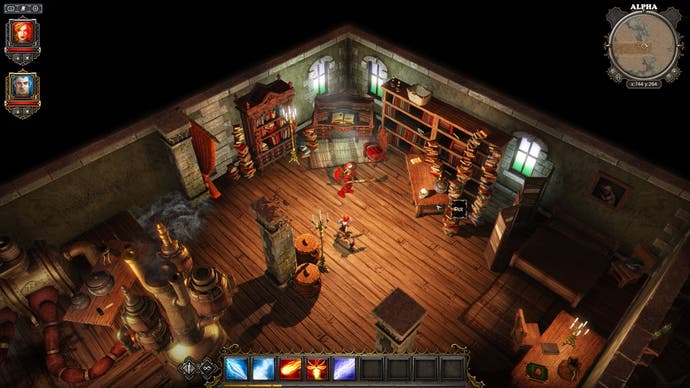
During my murder investigation, I ended up following a very particular line of enquiry. After tiring of many contradicting stories, as well as alienating a few people, I gave up talking to the residents of the town I was in and, after finding a shovel, started digging my way through the graveyard in the hunt for clues. I'd also taken one of the more unusual skills available to me, one that allowed me to speak with animals and something that blessed me with a host of unexpected hints. I soon found a local dog's knowledge (and nose) far more helpful and I was starting to feel like a proper detective when Vincke pointed out that, if I got impatient, I could always start killing people. It wouldn't break the quest, he said, and sooner or later I'd find either more clues or even the murderer.
It's a system he calls "N+1 design," whereby there's always one surefire way to reach an objective, should all else fail, but additional approaches also exist. He gives an example of the idea by describing how he might solve one of the most famous heists in the history of Ghent, Larian's home city.
"Say there's five guys in my city who know who stole the famous painting in the St Bavo Cathedral," he says. "Now, if I nuke Ghent, nobody will find out who stole it, but maybe I'll stumble upon the painting in a cellar. That approach would take me a lot of exploration. On the other hand, I might talk a lot; I might talk to the granddaughter of the thief and she might give me a hint. Or I might arrest the same bunch of burglars while they're stealing another painting. Or I might arrest their dealer, that's how I could also get my information. That's the design principle that runs through the entire game. We had a couple of rules in place to make sure that, no matter what you did, you would be able to complete things in the end."
This, he says, gives players room to try all sorts of approaches and play their characters however they want. Like Vincke, they too can experiment and, he says, perhaps have "accidents" without breaking the game: "Always have a fall-back solution that is robust enough to survive whatever happens."
Between us, we have many such accidents, not least because of the independence we have. Divinity: Original Sin can be a single-player experience, with one player controlling both of the game's main characters, but it's Larian's hope that many players will enjoy it as a two-player game, where yet another system comes to the fore.
It's a game in which both players have equal agency in the world, including the freedom to separate, to behave very differently and, most importantly, to disagree. Unlike, say, multiplayer Baldur's Gate, where other players would have to quietly watch their party leader talk through another conversation, Divinity: Original Sin allows both players to contribute to the dialogue and even argue about what they want to do. Disagreements modify each character's stats, perhaps making one more egotistical as another becomes more empathic, and these stats can affect future deliberations and swing arguments one way or another.
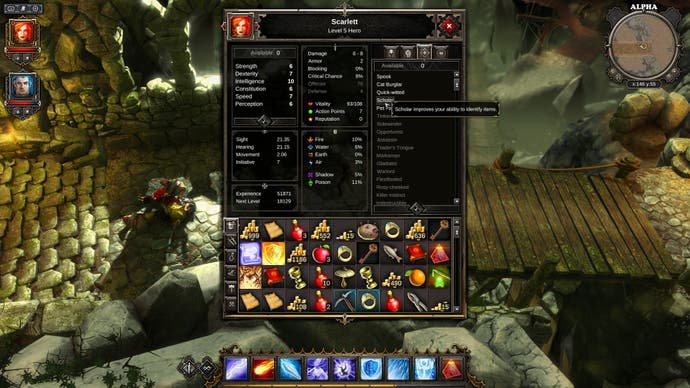
To have all these systems running in parallel - the open-world exploration, the crafting, the Magicka-style spells, the reputation, the character independence - is extremely difficult. "It's very QA-unfriendly," Vincke says, explaining how the game has so few bottlenecks or triggers, points or places where players are supposed to go or to be, simply because Larian don't believe the players should be supposed to do anything. "We're encountering a lot of issues and we're learning a lot. You have no idea how many things we had to stop doing because it got too complex. But that's where the editor gets interesting..."
Divinity: Original Sin will also ship with the same editor that Larian are using to make it. While it's hardly got training wheels attached, it's a relatively accessible development tool that's both very visual and which gives modders the chance to alter almost every element in the game, from landscapes to characters to mechanics. If modders want to build in even more complex systems then, well, they have those same tools at their disposal.
They're tools that Vincke says have made development a lot easier and which, he hopes, will give modders a very broad canvas across which they can work. He's excited for what might come and hopes for diverse results. "It's going to be mission accomplished if, say, I play a sci-fi RPG made with these tools," he says. "Or I can easily make a game just based more around guns in here. Maybe a squad-based World War 2 game."
Divinity: Original Sin has hit alpha, and Larian's currently preparing a version for Steam early access. Its biggest challenge is tying all the diverse strands of the game together and, critically, keeping things balanced. Vincke concedes that this part of the development process brings about a lot of headaches, but he says that the many, many ingredients that his team have mixed into Divinity: Original Sin have had an unexpected and encouraging outcome: the game is turning out to be much larger than they first expected.
Larian has a lot ahead of it, and it's an understatement to say that the vision for Divinity: Original Sin is ambitious. Uniting all those systems and ideas into a coherent whole is not going to be easy, but if the developer can succeed then it will have a very singular game to show for it, the likes of which, Vincke suggests, the world has not seen in 20 years.
This article was based on a press trip to Larian's offices in Belgium. Larian paid for travel and accommodation.


